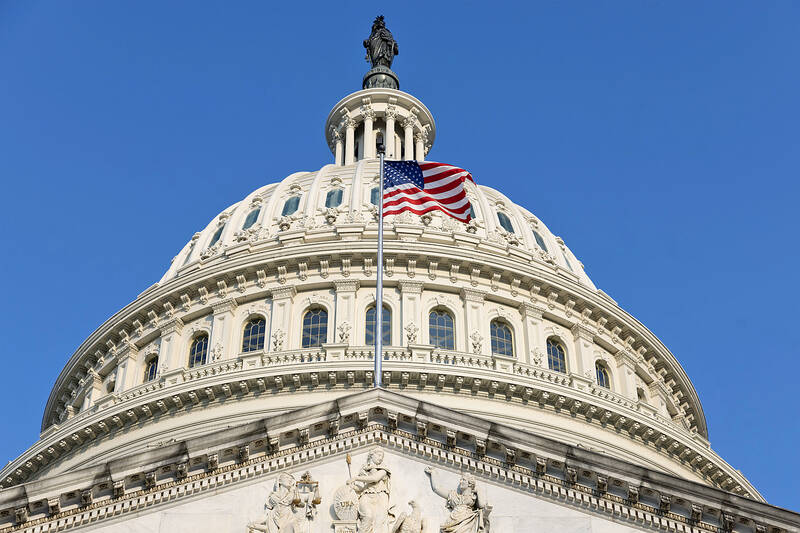The US Senate Committee on Armed Services on Thursday released an executive summary of the National Defense Authorization Act (NDAA) for Fiscal Year 2025 with a provision asking the Pentagon to establish a “regional contingency stockpile” of arms for Taiwan.
The committee voted 22-3 to advance the US$923.3 billion bill to the Senate floor, hours before a competing version passed the US House of Representatives.
The US Department of Defense would be required to ensure Taiwan is aligned with the US National Defense Industrial Strategy to increase global defense production, secure supply chains and meet Taiwan’s defense needs, the executive summary says.

Photo: EPA-EFE
Under a section on “countering Chinese aggression,” the summary says the Pentagon must prepare a report on the implications of Beijing-Moscow military cooperation on the US’ national security and propose a transregional strategy to reveal the Chinese People’s Liberation Army’s (PLA) “malign activities.”
Each “geographic combatant command” of the US armed forces would be required “to designate a lead component to coordinate transregional efforts to counter malign activities by the PLA,” it says.
The bill would also create an “expanded competition office” to counter “gray zone” economic activities by adversaries, and authorize an additional US$100 million budget for the US Indo-Pacific Command Joint Training Team, the summary says.
The US House of Representatives at noon on Friday passed its version of the NDAA, requiring the Pentagon to report on efforts to bolster defense industry cooperation with Taiwan.
The US House bill would also require the US Federal Communications Commission to ban uncrewed aerial vehicles produced by China’s Shenzhen DJI Science and Technology Co (大疆創新) from US skies.
The House and Senate are pushing to ban drones from China-based companies DJI and Autel Robotics Co (道通智能航空技) after reports linked the two companies to the Chinese Communist Party and the PLA, the Hill newspaper reported on Wednesday.
The US Department of Defense, which is prevented by legislation from buying Chinese drones, previously expressed concerns over the companies, it said.
The Senate committee and the House would next negotiate and pass a final version of the NDAA, which would be sent to the president to be signed into law.

The Central Election Commission has amended election and recall regulations to require elected office candidates to provide proof that they have no Chinese citizenship, a Cabinet report said. The commission on Oct. 29 last year revised the Measures for the Permission of Family-based Residence, Long-term Residence and Settlement of People from the Mainland Area in the Taiwan Area (大陸地區人民在台灣地區依親居留長期居留或定居許可辦法), the Executive Yuan said in a report it submitted to the legislature for review. The revision requires Chinese citizens applying for permanent residency to submit notarial documents showing that they have lost their Chinese household record and have renounced — or have never

A magnitude 5.6 earthquake struck off the coast of Yilan County at 12:37pm today, with clear shaking felt across much of northern Taiwan. There were no immediate reports of damage. The epicenter of the quake was 16.9km east-southeast of Yilan County Hall offshore at a depth of 66.8km, Central Weather Administration (CWA) data showed. The maximum intensity registered at a 4 in Yilan County’s Nanao Township (南澳) on Taiwan’s seven-tier scale. Other parts of Yilan, as well as certain areas of Hualien County, Taipei, New Taipei City, Taoyuan, Hsinchu County, Taichung and Miaoli County, recorded intensities of 3. Residents of Yilan County and Taipei received

Taiwan has secured another breakthrough in fruit exports, with jujubes, dragon fruit and lychees approved for shipment to the EU, the Ministry of Agriculture said yesterday. The Animal and Plant Health Inspection Agency on Thursday received formal notification of the approval from the EU, the ministry said, adding that the decision was expected to expand Taiwanese fruit producers’ access to high-end European markets. Taiwan exported 126 tonnes of lychees last year, valued at US$1.48 million, with Japan accounting for 102 tonnes. Other export destinations included New Zealand, Hong Kong, the US and Australia, ministry data showed. Jujube exports totaled 103 tonnes, valued at

BIG SPENDERS: Foreign investors bought the most Taiwan equities since 2005, signaling confidence that an AI boom would continue to benefit chipmakers Taiwan Semiconductor Manufacturing Co’s (TSMC, 台積電) market capitalization swelled to US$2 trillion for the first time following a 4.25 percent rally in its American depositary receipts (ADR) overnight, putting the world’s biggest contract chipmaker sixth on the list of the world’s biggest companies by market capitalization, just behind Amazon.com Inc. The site CompaniesMarketcap.com ranked TSMC ahead of Saudi Aramco and Meta Platforms Inc. The Taiwanese company’s ADRs on Tuesday surged to US$385.75 on the New York Stock Exchange, as strong demand for artificial intelligence (AI) applications led to chip supply constraints and boost revenue growth to record-breaking levels. Each TSMC ADR represents